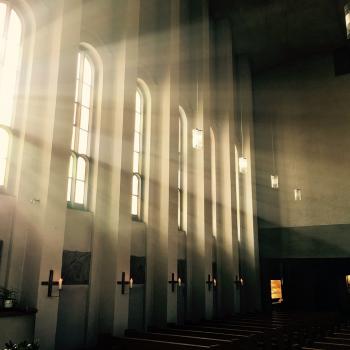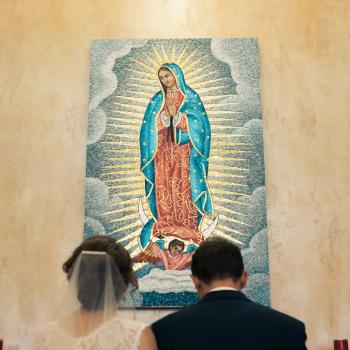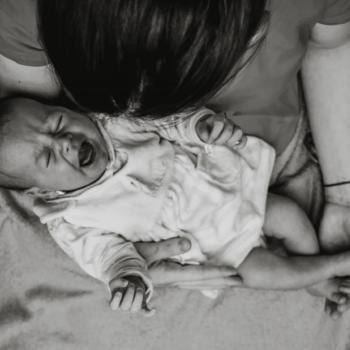Lots. Especially if the one doing the blessing is a lay person.
Fr. Z rants about it again this morning.
I posted on this topic last year. With Easter approaching, and more people crowding into churches (and more EMHCs likely being pressed into duty), it’s worth revisiting this thorny issue.
As a priest mentioned last year:
A priest does not have the authority to add a blessing to the liturgy for anyone, because a priest does not have the authority to add anything to the liturgy. It doesn’t matter if other priests go beyond their authority and do it in disobedience. In my mind, it is inappropriate, and I will not. Period.
Of course, people don’t like to hear that. They think it makes the kids feel “special” that they receive this blessing. (As an aside, I think the parents and grandparents get the warm-fuzzies more than the kids do.) Of course, they can’t be blamed. For 30+ years, they’ve been fed a mindset that the liturgy is malleable to whatever we want to do with it. Blessing for kids? Sure, we can add that right during Communion. Having kids come up for the homily and sit with the priest on the sanctuary steps? Sure, we can do that. Holding hands during the Our Father and running around the nave greeting people during the Sign of Peace? Absolutely! Whatever makes you feel good!
As I’ve studied more about the theology of the liturgy, I’ve come to the realization that this “feel good” approach is sending the wrong message about the liturgy. I’ve also become concerned that this has dangerously damaged their relationship with God, and they are blissfully unaware that any damage has been done. Instead of liturgy being the community focusing their minds and hearts on worship of God, it has become a social activity, focusing on ourselves. Now, we don’t come to liturgy to turn to God, but to ourselves. For this reason alone, I despise blessing children (and yes, I chose that strong language very carefully), and encourage other priests to stop immediately.
More to the point, the Congregation for Divine Worship has written on this topic:
1. The liturgical blessing of the Holy Mass is properly given to each and to all at the conclusion of the Mass, just a few moments subsequent to the distribution of Holy Communion.
2. Lay people, within the context of Holy Mass, are unable to confer blessings. These blessings, rather, are the competence of the priest (cf. Ecclesia de Mysterio, Notitiae 34 (15 Aug. 1997), art. 6, § 2; Canon 1169, § 2; and Roman Ritual De Benedictionibus(1985), n. 18).
3. Furthermore, the laying on of a hand or hands — which has its own sacramental significance, inappropriate here — by those distributing Holy Communion, in substitution for its reception, is to be explicitly discouraged.
For myself, when confronted with a child (or sometimes an adult) who seeks a blessing instead of the Eucharist, I prefer this formula: “Receive Jesus in your heart”—which is not a blessing, but an admonition. It could be said by a priest, deacon or lay person. And it fits.
Until the faithful can be properly catechized on this, I don’t think flat-out refusing a blessing is helpful. It certainly doesn’t do much to advance the cause of evangelization.
But meantime: EMHCs (and for that matter, deacons) have no business blessing anyone during Mass.
UPDATE: Ed Peters wrote more about the canonical implications of all this a few years back:
1. Blessing the faithful with the Most August Sacrament is expressly reserved to the ordained. Lay persons may not confer any blessings with the Host (Eucharistic worship outside of Mass nn. 91, 97-99, and 1983 CIC 1168). This practice should therefore be immediately halted wherever it has cropped up.
2. Touching many persons’ hair, faces, and/or garments while serving food (albeit divine Food) to the public has to be a violation of some health and safety regulation somewhere, not to mention its being poor manners. If the swine flu makes distribution from a common Cup an issue, surely touching hair and heads while serving others food from a common Plate is a problem. This particular practice should therefore be halted promptly, regardless of what one might think about lay blessings during Mass.
3. Ministers of holy Communion have, I suggest, no authority by their office*** to confer any sort of blessing on anyone. Neither the General Instruction on the Roman Missal nor the Book of Blessings (which later source makes provisions for laity to administer certain blessings) authorizes ministers of Communion to confer blessings during Mass. Given that lay persons serving as extraordinary ministers of holy Communion have no liturgical duties besides the administration of Communion, the introduction of a mini-blessing rite to be performed by them seems to me a plain violation of Canon 846. This practice should, I think, be halted pending a study of its liceity by qualified persons and, if appropriate, its authorization by the competent authority (1983 CIC 838,1167).












